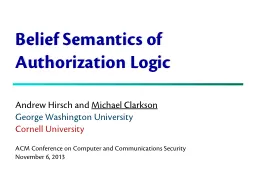PDF-Moorean Facts and Belief Revision, orCan the Skeptic Win? in the words
Author : faustina-dinatale | Published Date : 2015-10-23
2 In proceeding in this way Lewis is far from alone among prominent contemporary philosophers Compare David Armstrong on the proposition that Things move It is a
Presentation Embed Code
Download Presentation
Download Presentation The PPT/PDF document "Moorean Facts and Belief Revision, orCan..." is the property of its rightful owner. Permission is granted to download and print the materials on this website for personal, non-commercial use only, and to display it on your personal computer provided you do not modify the materials and that you retain all copyright notices contained in the materials. By downloading content from our website, you accept the terms of this agreement.
Moorean Facts and Belief Revision, orCan the Skeptic Win? in the words: Transcript
Download Rules Of Document
"Moorean Facts and Belief Revision, orCan the Skeptic Win? in the words"The content belongs to its owner. You may download and print it for personal use, without modification, and keep all copyright notices. By downloading, you agree to these terms.
Related Documents














